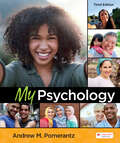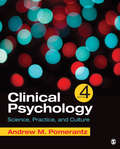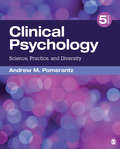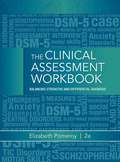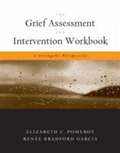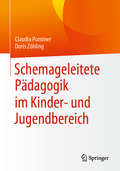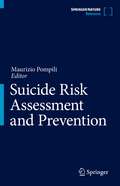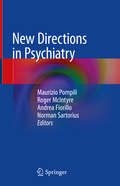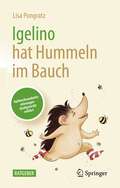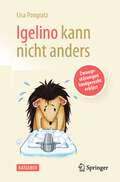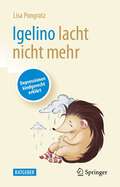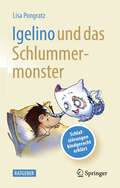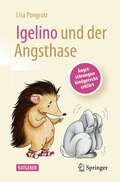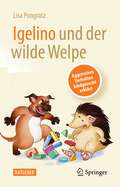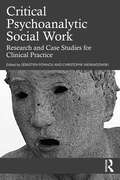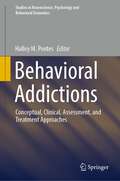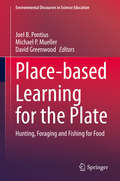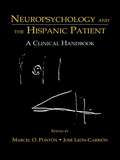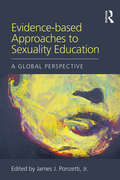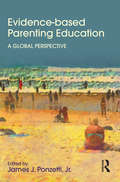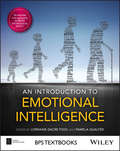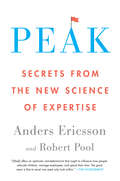- Table View
- List View
My Psychology
by Andrew M. PomerantzAndy Pomerantz’s My Psychology helps you understand how the science of psychology applies to your own unique life experiences.
Clinical Psychology: Science, Practice, and Culture
by Dr Andrew M. PomerantzRecipient of the 2017 Textbook Excellence Award from the Textbook & Academic Authors Association (TAA) Up to date with current DSM-5 coverage throughout, the comprehensive, highly-readable Fourth Edition of Clinical Psychology: Science, Practice, and Culture provides students vital exposure to the real-world practice of clinical psychology balanced with the latest research in the field. Throughout the book, author Andrew M. Pomerantz explores clinical assessment, psychotherapy, ethical and professional issues, current controversies, and specialized topics in a scholarly, yet fascinating, easy-to-read style. Value-priced and packed with clinical examples, the Fourth Edition offers more coverage of cultural/diversity issues in clinical psychology than any other text for the course, as well as thorough coverage of recent, prominent developments in psychotherapy and clinical assessment. New topics, new pedagogy, expanded discussions of ethics, and hundreds of new references published since 2014 make this a resource students will keep and refer to throughout their professional lives.
Clinical Psychology: Science, Practice, and Culture
by Dr Andrew M. PomerantzRecipient of the 2017 Textbook Excellence Award from the Textbook & Academic Authors Association (TAA) Up to date with current DSM-5 coverage throughout, the comprehensive, highly-readable Fourth Edition of Clinical Psychology: Science, Practice, and Culture provides students vital exposure to the real-world practice of clinical psychology balanced with the latest research in the field. Throughout the book, author Andrew M. Pomerantz explores clinical assessment, psychotherapy, ethical and professional issues, current controversies, and specialized topics in a scholarly, yet fascinating, easy-to-read style. Value-priced and packed with clinical examples, the Fourth Edition offers more coverage of cultural/diversity issues in clinical psychology than any other text for the course, as well as thorough coverage of recent, prominent developments in psychotherapy and clinical assessment. New topics, new pedagogy, expanded discussions of ethics, and hundreds of new references published since 2014 make this a resource students will keep and refer to throughout their professional lives.
Clinical Psychology: Science, Practice, and Diversity
by Dr. Andrew M. PomerantzThe best-selling Clinical Psychology: Science, Practice, and Diversity presents an inclusive and culturally competent view of the vast world of clinical psychology. Through lively examples, robust scholarship, and a highly readable narrative, award-winning author Andrew M. Pomerantz explores the key topics of clinical assessment, psychotherapy, and ethical and professional issues while also incorporating discussions of current controversies and specialized topics. The Fifth Edition includes a new career-focused feature, original videos addressing ethical issues, and updates reflecting the latest research findings in the field.
Clinical Psychology: Science, Practice, and Diversity
by Dr. Andrew M. PomerantzThe best-selling Clinical Psychology: Science, Practice, and Diversity presents an inclusive and culturally competent view of the vast world of clinical psychology. Through lively examples, robust scholarship, and a highly readable narrative, award-winning author Andrew M. Pomerantz explores the key topics of clinical assessment, psychotherapy, and ethical and professional issues while also incorporating discussions of current controversies and specialized topics. The Fifth Edition includes a new career-focused feature, original videos addressing ethical issues, and updates reflecting the latest research findings in the field.
When Someone You Love Has Cancer
by Dana Rae PomeroyThis book is a valuable resource for anyone with a serious illness or those who care for or about a cancer patient. It is full of emotional support and practical guidance especially for those coping with these difficult realities for the first time or those who hope to cope better than they may have at an earlier time. Brief and to the point, the author imparts Information about such issues as: accepting the diagnosis, emotions and attitudes, sexual Concerns, children's issues, the medical team, getting help from agencies, nutrition, how friends and family can help, home nursing and alternatives, caregiver health issues, insurance and medical record-keeping, the practical matters of death, and many more. The book can be read straight through or the table of contents used to look up answers to specific questions. The appendices provide models of important forms such as wills and power of attorney. There are also long lists of contact information for agencies nationwide which provide assistance. [from the back cover "DANA RAE POMEROY is a nationally known lecturer in hospice work. She wrote this personal account of her caregiver journey from the first days of her husband's cancer diagnosis through the final days to acceptance. Ms. Pomeroy owns and operates The Writer's Edge, an editorial and literary agency. She has written computer software programs and edited books for various publishers."
The Clinical Assessment Workbook Balancing Strengths and Differential Diagnosis Second Edition
by Elizabeth PomeroyThis practical workbook facilitates readers' understanding of the DSM-5 and other texts related to the diagnoses of mental disorders, enhancing their ability to assess their clients' strengths and to diagnose any emotional difficulties the clients may be experiencing. As a workbook, it offers a wealth of real life examples and exercises, providing users with the opportunity to practice their assessment skills in a classroom environment prior to entering the field as a mental health professional. Readers learn the various diagnostic categories of the DSM-5-along with dual diagnoses, symptom formulation, and the overlap between diagnostic categories-as well as how to apply these categories to clients they will be seeing in practice.
The Grief Assessment and Intervention Workbook: A Strengths Perspective
by Elizabeth C. Pomeroy Renee Bradford GarciaTHE GRIEF ASSESSMENT AND INTERVENTION WORKBOOK: A STRENGTHS PERSPECTIVE is an exceptional new workbook that provides focused, practical guidance to help students function effectively in their roles as helpers when dealing with the dying or death of clients or clients' loved ones. Designed for use in social work and counseling courses on grief and loss, grief counseling, and bereavement therapy courses, the text can also serve as a valuable supplemental resource for practice or field courses across multiple disciplines. Using a strengths-perspective approach, the authors explore various theories of grief and delineate several intervention approaches, including developmental and cultural factors that impact the severity of grief reactions. The text also provides several grief assessment instruments used by practitioners, in-depth case scenarios to illustrate key concepts, and hands-on exercises for applying grief assessment and intervention techniques.
Schemageleitete Pädagogik im Kinder- und Jugendbereich
by Claudia Pommer Doris ZöhlingSchemageleitete Pädagogik ist die konsequente Anwendung des aktuellen Wissensstandes über die Folgen und Symptome von stark belasteten Kinder- und Jugendlichen mit ihren Familiensystemen zur Gestaltung des sozialpädagogischen Alltags. Dabei baut sie eine Brücke von der Schematherapie zur sozial- und heilpädagogischen Praxis in Kindergärten, Schulen und Kinder- und Jugendhilfeeinrichtungen. Für ErzieherInnen, LehrerInnen, SozialpädagogInnen, PsychologInnen und SozialarbeiterInnen dient das Buch als Einführung in dieses innovative Konzept und praktische Handreichung.
Suicide Risk Assessment and Prevention
by Maurizio PompiliThis book explores suicide prevention perspectives from around the world, considering both professionals’ points of view as well as first-person accounts from suicidal individuals. Scholars around the globe have puzzled over what makes a person suicidal and what is in the minds of those individuals who die by suicide. Most often the focus is not on the motives for suicide, nor on the phenomenology of this act, but on what is found from small cohorts of suicidal individuals. This book offers a tentative synthesis of a complex phenomenon, and sheds some light on models of suicide that are less frequently encountered in the literature. Written by international experts, it makes a valuable contribution to the field of suicidology that appeals to a wide readership, from mental health professionals to researchers in suicidology and students.
New Directions in Psychiatry
by Maurizio Pompili Roger McIntyre Andrea Fiorillo Norman SartoriusThis book focuses on hot issues faced by clinicians in everyday clinical practice, and provides in-depth analyses of both met and unmet needs in the management of psychiatric disorders. It has been repeatedly shown that the needs of patients, relatives, the community at large and those of the governmental bodies only partially overlap. For instance, patients in their families are more concerned about quality of life, treatment, autonomy, and independent living; whereas governmental stakeholders are typically more concerned about relapse prevention and reduction of hospitalizations. As such, a volume bridging the gap between theoretical notions and practical understanding of patients’ untreated aspects of their psychiatric disorders is much needed. Instead of focusing on traditional descriptions of psychopathology and diagnostic criteria, the volume guides readers to core problems for each topic, taking into account new approaches in the classification of mental disorders as proposed by DSM-5. It elaborates on much-debated controversial problems such as the assessment and treatment of psychomotor agitation, and non-adherence to treatment that impacts on the psychiatric context. With its unique approach, this volume appeals to anyone with an interest in the field, including researchers, clinicians, and trainees.
Igelino hat Hummeln im Bauch: Aufmerksamkeitsstörungen kindgerecht erklärt
by Lisa PongratzJedes Buch der Serie vom kleinen Igel Igelino thematisiert eine häufig vorkommende psychische Erkrankung im Kindes- und Jugendalter. Die Geschichten und Erklärungen sind auf kindgerechte, enttabuisierende Weise gestaltet und von einem jungen, künstlerischen Talent illustriert.Mit diesem Ratgeber erhalten Eltern und Angehörige die Möglichkeit, ihren noch jungen Kindern mit Hilfe der Geschichte von Igelino die menschliche Psyche im Falle einer Aufmerksamkeitsdefizitstörung (ADHS) altersgerecht verständlich zu machen. Hierbei liegt der Fokus jedoch nicht auf der eigenen Erkrankung bzw. den eigenen Symptomen, sondern auch in der Vermittlung von Wissen über psychische Störungen bei Familienmitgliedern, Freund*innen oder Klassenkamerad*innen mit Verhaltensauffälligkeiten.Eltern erhalten darüber hinaus wichtige grundlegende Informationen zur psychischen Störung, Tipps, wie eine solche Störung erkannt (und von anderen Verhaltensauffälligkeiten abgegrenzt) werden kann, wie man sich gegenüber Betroffenen verhält, sowie Informationen über Therapiemöglichkeiten, Anlaufstellen für Hilfsangebote und eigenständig durchführbare Interventionen in Form von Ressourcenübungen.
Igelino kann nicht anders: Zwangsstörungen kindgerecht erklärt
by Lisa PongratzJedes Buch der Serie vom kleinen Igel Igelino thematisiert eine häufig vorkommende psychische Erkrankung im Kindes- und Jugendalter. Die Geschichten und Erklärungen sind auf kindgerechte, enttabuisierende Weise gestaltet und von einem jungen, künstlerischen Talent illustriert.Mit diesem Ratgeber erhalten Eltern und Angehörige die Möglichkeit, ihren noch jungen Kindern mit Hilfe der Geschichte von Igelino die menschliche Psyche im Falle einer Zwangsstörung altersgerecht verständlich zu machen. Hierbei liegt der Fokus jedoch nicht auf der eigenen Erkrankung bzw. den eigenen Symptomen, sondern auch in der Vermittlung von Wissen über psychische Störungen bei Familienmitgliedern, Freund*innen oder Klassenkamerad*innen mit Verhaltensauffälligkeiten.Eltern erhalten darüber hinaus wichtige grundlegende Informationen zur psychischen Störung, Tipps, wie eine solche Störung erkannt (und von anderen Verhaltensauffälligkeiten abgegrenzt) werden kann, wie man sich gegenüber Betroffenen verhält, sowie Informationen über Therapiemöglichkeiten, Anlaufstellen für Hilfsangebote und eigenständig durchführbare Interventionen in Form von Ressourcenübungen.1. Psychische Störungen: Zahlen und Fakten.- 2. Tipps zum gemeinsamen Lesen. -3. Igelino kann nicht anders.- 4. Was ist eine Zwangsstörung?.- 5. Wie entsteht eine Zwangsstörung?.- 6. Wer kann helfen?.- 7. Was können wir tun?.
Igelino lacht nicht mehr: Depressionen kindgerecht erklärt
by Lisa PongratzJedes Buch der Serie vom kleinen Igel Igelino thematisiert eine häufige psychische Erkrankung im Kindesalter. Die Geschichten und Erklärungen sind auf kindgerechte, enttabuisierende Weise gestaltet.Mit diesem Ratgeber erhalten Eltern und Angehörige die Möglichkeit, mit Hilfe der Geschichte von Igelino, ihren noch jungen Kindern altersgerecht die menschliche Psyche im Falle einer Depression verständlich zu machen. Hierbei liegt der Fokus jedoch nicht nur auf der eigenen Erkrankung bzw. den eigenen Symptomen, sondern auch in der Vermittlung von Wissen über psychische Störungen bei Familienmitgliedern, Freund*innen oder Klassenkamerad*innen mit Verhaltensauffälligkeiten.Eltern erhalten darüber hinaus wichtige grundlegende Informationen zur psychischen Störung, Tipps, wie eine solche Störung erkannt (und von anderen Verhaltensauffälligkeiten abgegrenzt) werden kann, wie man sich gegenüber Betroffenen verhält, sowie Informationen über Therapiemöglichkeiten und Anlaufstellen für Hilfsangebote.
Igelino und das Schlummermonster: Schlafstörungen und Albträume kindgerecht erklärt
by Lisa PongratzJedes Buch der Serie vom kleinen Igel Igelino thematisiert eine häufig vorkommende psychische Erkrankung im Kindes- und Jugendalter. Die Geschichten und Erklärungen sind auf kindgerechte, enttabuisierende Weise gestaltet und von einem jungen, künstlerischen Talent illustriert.Mit diesem Ratgeber erhalten Eltern und Angehörige die Möglichkeit, ihren noch jungen Kindern mit Hilfe der Geschichte von Igelino die menschliche Psyche im Falle einer Schlafstörung altersgerecht verständlich zu machen. Hierbei liegt der Fokus jedoch nicht auf der eigenen Erkrankung bzw. den eigenen Symptomen, sondern auch in der Vermittlung von Wissen über psychische Störungen bei Familienmitgliedern, Freund*innen oder Klassenkamerad*innen mit Verhaltensauffälligkeiten.Eltern erhalten darüber hinaus wichtige grundlegende Informationen zur psychischen Störung, Tipps, wie eine solche Störung erkannt (und von anderen Verhaltensauffälligkeiten abgegrenzt) werden kann, wie man sich gegenüber Betroffenen verhält, sowie Informationen über Therapiemöglichkeiten, Anlaufstellen für Hilfsangebote und eigenständig durchführbare Interventionen in Form von Ressourcenübungen.1. Psychische Störungen: Zahlen und Fakten.- 2. Tipps zum gemeinsamen Lesen.- 3. Igelino und das Schlummermonster.- 4. Was ist eine Schlafstörung ?- 5. Wie entsteht eine Schlafstörung?- 6. Wer kann helfen?- 7. Was können wir tun?
Igelino und der Angsthase: Angststörungen und Phobien kindgerecht erklärt
by Lisa PongratzJedes Buch der Serie vom kleinen Igel Igelino thematisiert eine häufig vorkommende psychische Erkrankung im Kindes- und Jugendalter. Die Geschichten und Erklärungen sind auf kindgerechte, enttabuisierende Weise gestaltet und von einem jungen, künstlerischen Talent illustriert.Mit diesem Ratgeber erhalten Eltern und Angehörige die Möglichkeit, ihren noch jungen Kindern mit Hilfe der Geschichte von Igelino die menschliche Psyche im Falle einer Angststörung altersgerecht verständlich zu machen. Hierbei liegt der Fokus jedoch nicht auf der eigenen Erkrankung bzw. den eigenen Symptomen, sondern auch in der Vermittlung von Wissen über psychische Störungen bei Familienmitgliedern, Freund*innen oder Klassenkamerad*innen mit Verhaltensauffälligkeiten.Eltern erhalten darüber hinaus wichtige grundlegende Informationen zur psychischen Störung, Tipps, wie eine solche Störung erkannt (und von anderen Verhaltensauffälligkeiten abgegrenzt) werden kann, wie man sich gegenüber Betroffenen verhält, sowie Informationen über Therapiemöglichkeiten, Anlaufstellen für Hilfsangebote und eigenständig durchführbare Interventionen in Form von Ressourcenübungen.1. Psychische Störungen: Zahlen und Fakten.- 2. Tipps zum gemeinsamen Lesen.- 3. Igelino und der Angsthase.- 4. Was ist eine Angststörung/Phobie?- 5. Wie entsteht eine Angststörung/Phobie?- 6. Wer kann helfen?- 7. Was können wir tun?
Igelino und der wilde Welpe: Aggressives Verhalten kindgerecht erklärt
by Lisa PongratzJedes Buch der Serie vom kleinen Igel Igelino thematisiert eine häufig vorkommende psychische Erkrankung im Kindes- und Jugendalter. Die Geschichten und Erklärungen sind auf kindgerechte, enttabuisierende Weise gestaltet und von einem jungen, künstlerischen Talent illustriert.Mit diesem Ratgeber erhalten Eltern und Angehörige die Möglichkeit, ihren noch jungen Kindern mit Hilfe der Geschichte von Igelino die menschliche Psyche im Falle aggressives Verhaltens (Störung des Sozialverhaltens, komplexe Traumatisierungen, Mobbing, Pubertät und Persönlichkeitsstörungen) altersgerecht verständlich zu machen. Hierbei liegt der Fokus jedoch nicht auf der eigenen Erkrankung bzw. den eigenen Symptomen, sondern auch in der Vermittlung von Wissen über psychische Störungen bei Familienmitgliedern, Freund*innen oder Klassenkamerad*innen mit Verhaltensauffälligkeiten.Eltern erhalten darüber hinaus wichtige grundlegende Informationen zur psychischen Störung, Tipps, wie eine solche Störung erkannt (und von anderen Verhaltensauffälligkeiten abgegrenzt) werden kann, wie man sich gegenüber Betroffenen verhält, sowie Informationen über Therapiemöglichkeiten, Anlaufstellen für Hilfsangebote und eigenständig durchführbare Interventionen in Form von Ressourcenübungen.1. Psychische Störungen: Zahlen und Fakten.- 2. Tipps zum gemeinsamen Lesen.- 3. Igelino und der wilde Welpe.- 4. Was ist aggressives Verhalten?- 5. Wie entsteht aggressives Verhalten?- 6. Wer kann helfen?- 7. Was können wir tun?
Critical Psychoanalytic Social Work: Research and Case Studies for Clinical Practice
by Sébastien Ponnou Christophe NiewiadomskiThis international and interdisciplinary collection argues for the use of clinical-based practices and research in social work, bringing together critical psychoanalytic ideas into social work practice to help tackle contemporary issues. With a Foreword written by Stephen Webb, this book brings together specialists from the main areas of research and clinical practices in social work, ranging from psychoanalysis, sociology, clinical psychology, ethnopsychiatry and philosophy. Arguing for a movement away from evidence-based practice, chapters discuss the need for psychoanalytic thought in contemporary social work knowledge, how this can be integrated in social work practice and training, the challenges faced by training and practicing social workers and the ethical issues relating to clinical-based practice. Filled with case studies throughout, these diverse and rich contributions will make social workers think deeply about advocacy, ethics and the systemic changes needed in the field. This book will be invaluable reading to training and practicing clinical social workers and mental health professionals interested in social intervention. It will also be interesting to psychoanalysts as well as those studying sociology, clinical psychology and philosophy.
Behavioral Addictions: Conceptual, Clinical, Assessment, and Treatment Approaches (Studies in Neuroscience, Psychology and Behavioral Economics)
by Halley M. PontesThis book provides a holistic evidence-based perspective on conceptual, clinical, assessment, and treatment aspects of key non-substance-based addictive disorders related to: gambling, gaming, social media, smartphone, internet, love, sex, exercise, work, and shopping. Each chapter focuses on a different addictive disorder and is structured in a user-friendly way to enable the reader fast navigation, yet the main aspects of the respective disorders are covered in the necessary depth. All in all, this book offers a timely, self-contained introduction to both key concepts and the latest scientific developments in behavioral addictions. It addresses mental health practitioners, researchers in psychology, neuroscience and communication, and undergraduate and postgraduate students alike.
Place-based Learning for the Plate: Hunting, Foraging and Fishing for Food (Environmental Discourses in Science Education #6)
by Joel B. Pontius Michael P. Mueller David GreenwoodThis edited volume explores 21st century stories of hunting, foraging, and fishing for food as unique forms of place-based learning. Through the authors’ narratives, it reveals complex social and ecological relationships while readers sample the flavors of foraging in Portland, Oregon; feel some of what it’s like to grow up hunting and gathering as a person of Oglala Lakota and Shoshone-Bannock descent; track the immersive process of learning to communicate with rocky mountain elk; encounter a road-killed deer as a spontaneous source of local meat, and more.Other topics in the collection connect place, food, and learning to issues of identity, activism, spirituality, food movements, conservation, traditional and elder knowledge, and the ethics related to eating the more-than-human world. This volume will bring lively discussion to courses on place-based learning, food studies, environmental education, outdoor recreation, experiential education, holistic learning, human dimensions of natural resource management, sustainability, food systems, environmental ethics, and others.
Neuropsychology and the Hispanic Patient: A Clinical Handbook
by Marcel O. Pontón José León-CarriónBy 2010, 15% of the U.S. population will be Hispanic. Neuropsychology and the Hispanic Patient: A Clinical Handbook brings together internationally recognized authorities to address the cultural, methodological, research, and forensic issues that must be considered by neuropsychologists seeking to be maximally effective in their work with members of the fastest-growing American minority group. It includes: * useful assessment decision trees; * summaries of normative data; * descriptions of tests available in Spanish; * extensive HIV and pediatric references; and * numerous charts and illustrations. Reflecting the latest demographic information and covering the developmental spectrum from pediatric to geriatric, this landmark Handbook will become an indispensable reference tool for clinicians and researchers alike.
Evidence-based Approaches to Sexuality Education: A Global Perspective
by James J. Ponzetti Jr.This is the first book to provide a multidisciplinary and global overview of evidence-based sexuality education (SE) programs and practices. Readers are introduced to the fundamentals of creating effective programs to prepare them to design new or implement existing programs that promote healthy sexual attitudes and relationships. Noted contributors from various disciplines critically evaluate evidence –based programs from around the globe and through the lifespan. Examples and discussion questions encourage application of the material. Guidance for those who wish to design, implement, and evaluate SE programs in various social contexts is provided. Each chapter follows a consistent structure so readers can easily compare programs: Learning Goals; Introduction; Conclusion; Key Points; Discussion Questions; and Additional Resources. The editor taught human sexuality and family life education courses for years. This book reviews the key information that his students needed to become competent professionals. Highlights of the book’s coverage include: Interdisciplinary, comprehensive summary of evidence-based SE programs in one volume. Prepares readers for professional practice as a Certified Family Life Educator (CFLE) or sex educator by highlighting the fundamentals of developing and implementing SE programs. Exposes readers to evidence-based SE programs from various social contexts including families, schools, communities, and religious institutions. Considers the developmental context of SE across the lifespan along with programs for LGBT individuals and persons with disabilities. Critically reviews SE programs from around the world including the US, Europe, Asia, Africa, Latin America, and other developing countries. The book opens with an historical overview. Part I focus on general frameworks of sexuality education including UNESCO’s International Technical Guidelines. How to develop, deliver, and implement evidence based SE programs, including ethical concerns, are explored in Part II. Part III exposes readers to evidence-based programs in various social contexts--families, schools, communities, and religious institutions. Part IV considers the developmental context of SE from early childhood through adolescence and adulthood along with programs for LGBT individuals and persons with disabilities. Part V examines diverse global contexts from the US, Latin America, Europe, Asia, Africa, and other developing countries. The book concludes with future trends and directions. Ideal for graduate or advanced undergraduate courses in sex education, sexual health, human sexuality, sex or marriage counseling, intimate relationships, family life education, or home, school, and community services taught in human development and family studies, psychology, social work, health education, nursing, education, and religion, and in seminaries and family clinics, the book also serves as a resource for practitioners, counselors, researchers, clergy members, and policy makers interested in evidence based SE programs, or those seeking to become CFLEs or sexuality educators.
Evidence-based Parenting Education: A Global Perspective (Textbooks in Family Studies)
by James J. Ponzetti Jr.This is the first book to provide a multidisciplinary, critical, and global overview of evidence-based parenting education (PEd) programs. Readers are introduced to the best practices for designing, implementing, and evaluating effective PEd programs in order to teach clients how to be effective parents. Noted contributors from various disciplines examine evidence –based programs from the U.S., Canada, Europe, Asia, Australia, as well as web-based alternatives. The best practices used in a number of venues are explored, often by the developers themselves. Examples and discussion questions encourage application of the material. Critical guidance for those who wish to design, implement, and evaluate PEd programs in various settings is provided. All chapters feature learning goals, an introduction, conclusion, key points, discussion questions, and additional resources. In addition to these elements, chapters in Part III follow a consistent structure so readers can easily compare programs—theoretical foundations and history, needs assessment and target audience, program goals & objectives, curriculum issues, cultural Implications, evidence-based research and evaluation, and professional preparation and training issues. The editor has taught parenting and family life education courses for years. This book reviews the key information that his students needed to become competent professionals. Highlights of the book’s coverage include: Comprehensive summary of evidence-based PEd training programs in one volume. Prepares readers for professional practice as a Certified Family Life Educator (CFLE) by highlighting the fundamentals of developing and evaluating PEd programs. Exposes readers to models of parenting education from around the world. The book opens with a historical overview of PEd development. It is followed by 20 chapters divided in four parts. The initial six chapters focus on fundamentals of parenting education --program design, implementation, evaluation, the role of mediators and moderators, as well as the U.S. Cooperative Extension Parent Framework. The three chapters in Part II review the latest status of parenting education in Europe, Asia, and web-based alternatives. Part III presents ten stellar, evidence-based parenting programs offered around the world. In addition to the learning goals, introduction, conclusion, key points, discussion questions, and additional resources that are found in all chapters, those in Part III also consider theoretical foundations and history, needs assessment and target audience, program goals & objectives, curriculum issues, cultural Implications, evidence based research and evaluation, and professional preparation and training issues. Part IV reviews future directions. Ideal for advanced undergraduate or graduate courses in parent education, parent-child relations, parenting, early childhood or family life education, family therapy, and home, school, and community services taught in human development and family studies, psychology, social work, sociology, education, nursing, and more, the book also serves as a resource for practitioners, counselors, clergy members, and policy makers interested in evidence based PEd programs or those seeking to become CFLEs or Parent Educators.
An Introduction to Emotional Intelligence (BPS Textbooks in Psychology)
by Lorraine Dacre Pool Pamela QualterBridges the gap between the scholarly literature and “pop-psych” books on EI Emotional Intelligence (EI) has become a topic of vast and growing interest worldwide and is concerned with the ways in which we perceive, identify, understand, and manage emotions. It is an aspect of individual difference that can impact a number of important outcomes throughout a person’s lifespan. Yet, until now there were no authoritative books that bridge the gap between scholarly articles on the subject, often published in obscure professional journals, and the kind of books found in the “pop-psych” sections of most large bookstores. This book fills that gap, addressing the key issues from birth through to old age, including the impact of EI on child development, social relationships, the workplace, and health. It is a useful introduction to the academic study of EI, including its history as a concept. Featuring contributions by an international team of EI researchers, this thought provoking and informative book offers students, educators, mental health professionals, and general readers a comprehensive, critical, and accessible introduction to state-of-the-art EI theory and research. From the historical origins of EI to its contemporary applications across an array of domains, An Introduction to Emotional Intelligence explores what the research evidence tells us about it, why it is important, and how it is measured. Throughout each chapter any potentially tricky words or concepts are highlighted and explained. And, most chapters feature activities to spur further reflection on the subject matter covered as well as ideas on how to apply aspects of EI to various questions or problems arising in the readers’ lives. Features contributions from expert authors from around the world with experience of researching and teaching EI theory and practice Makes EI concepts, foundations, research, and theory accessible to a wider audience of readers than ever before Explores EI’s roots in psychological thinking dating back to early 20th century and considers the reasons for its widespread popularity in contemporary times Reviews the latest research into the constructs of ability EI and trait EI and their validity in relation to health, wellbeing, social relationships, academic, and work performance An Introduction to Emotional Intelligence is fascinating and informative reading and a source of practical insight for students of psychology, management and leadership, education, social work and healthcare, and those working in education, health settings and in psychological counseling professions.
Peak: Secrets from the New Science of Expertise
by Robert Pool Anders EricssonFrom the world's reigning expert on expertise comes a powerful new approach to mastering almost any skill. Have you ever wanted to learn a language or pick up an instrument, only to become too daunted by the task at hand? Expert performance guru Anders Ericsson has made a career studying chess champions, violin virtuosos, star athletes, and memory mavens. Peak condenses three decades of original research to introduce an incredibly powerful approach to learning that is fundamentally different from the way people traditionally think about acquiring a skill. Ericsson's findings have been lauded and debated, but never properly explained. So the idea of expertise still intimidates us -- we believe we need innate talent to excel, or think excelling seems prohibitively difficult. Peak belies both of these notions, proving that almost all of us have the seeds of excellence within us -- it's just a question of nurturing them by reducing expertise to a discrete series of attainable practices. Peak offers invaluable, often counterintuitive, advice on setting goals, getting feedback, identifying patterns, and motivating yourself. Whether you want to stand out at work, or help your kid achieve academic goals, Ericsson's revolutionary methods will show you how to master nearly anything.
